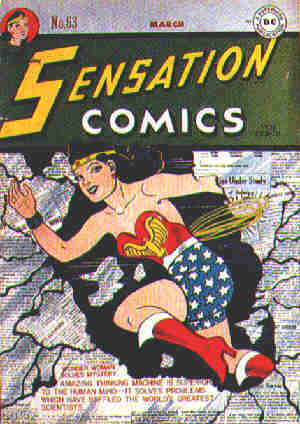| … male-dominated superhero world seemed to teach an unbalanced set of values to its youthful readership, he approached publisher Max Gaines with an idea for a character who would embody the feminine aspects of heroism.
The result was an 8-page insert in the 8th issue of All Star Comics (December, 1941), introducing Wonder Woman. She wasn't quite the first superhero woman in comics (that honor could belong to Invisible Scarlet O'Neil, The Woman in Red or any of several others), but she was certainly the most successful.
Her story (written by Marston under the name "Charles Moulton", a combination of his middle name and that of Gaines) began with the crash-landing of American pilot Steve Trevor on Paradise Island, home of the legendary Amazons. Diana, their princess, fell in love with him, and accompanied him back to "Man's World", where she put on a typically gaudy crime-fighting outfit, and started plying the superhero trade. The artist was Harry G. Peter, whose unusual style (reminiscent of that used by Lt. Dick Calkins in the Buck Rogers newspaper strip) gave Wonder Woman a look unlike that of any other comic book superhero.
All Star's regular headliners were The Justice Society of America, a team made up of heroes from several DC comics. Wonder Woman became a member six months after her introduction, beginning a tradition that persisted until the 1970s, that every superhero team has a token female member. In keeping with the times, Wonder Woman served as the JSA's secretary. By then, she was already being cover-featured in the monthly anthology Sensation Comics, headlining Comic Cavalcade in conjunction with The Flash and Green Lantern, and anchoring a title of her own.
Superheroes fell from favor in the late 1940s. Comic Cavalcade switched to funny animals in 1948, and All Star Comics became a western in 1951. Finally, with its August, 1952 issue, Sensation Comics switched to mystery stories. But Wonder Woman's own title stayed on, under a long succession of writers and artists. When superheroes came back, in the 1960s, she became a charter member of the Justice Society's successor, the Justice League of America while a younger version, Wonder Girl, joined The Teen Titans. Except for a single year during the late 1980s, while the character was being retooled, she has been in print steadily since her first appearance.
Wonder Woman was briefly, during the mid-1940s, the subject of a newspaper comic strip. She was also one of several main characters, along with Batman, Aquaman and Superman, on the animated Super Friends show, which started in 1973. Other than that, she never really broke out of comic books until the mid-1970s, when she became the subject of no less than two prime-time TV shows in two successive years.
The first was a 90-minute TV movie starring Cathy Lee Crosby, which first aired in 1974. It bore little resemblance to the comic book character, and garnered little fan enthusiasm — so little, in fact, that when Lynda Carter was cast in the role a year later, producers saw fit to distance themselves from the Crosby version by calling it The New, Original Wonder Woman. This time, the adaptation was faithful to the comics, and its success was great enough to launch Carter's star career.
It was about then that Wonder Woman became an icon to the fledgling feminist movement, appearing on the cover of the first issue of Ms. magazine. As the movement grew, she came to be a merchandising bonanza for her publisher, as well.
And every month, to this day, DC Comics brings out a new Wonder Woman comic book, with another brand-new adventure.
— DDM
BACK to Don Markstein's Toonopedia™ Home Page
Today in Toons: Every day's an anniversary!
| |
Purchase Wonder Woman Archive Editions Online
Purchase Wonder Woman Merchandise Online
|
